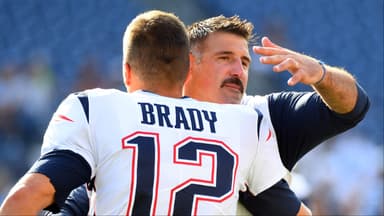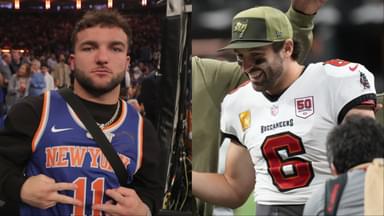Tom Brady will forever be remembered as the quarterback with seven Super Bowl rings. Yet what made him legendary wasn’t raw talent alone.
Advertisement
For example, he wasn’t the most coveted passer of his generation. Many would argue that Aaron Rodgers and Peyton Manning were. Nor was Brady a standout college prospect, as evidenced by his slipping to the 199th pick in the 2000 NFL Draft.
But what made TB12 the GOAT was his refusal to give in, a never-quit attitude forged long before his trophy-laden years. Or, in simple terms: the champion’s mindset.
In his latest edition of his 199 newsletter, Brady traced those roots back to his very first season as an NFL starter in 2001. He had thrown just three passes in his rookie year, but by Week 3 of 2001, after Drew Bledsoe’s injury, he was thrust into the starting role, facing none other than Peyton Manning and his Indianapolis Colts.
Unsurprisingly, Brady’s debut performance wasn’t anything to write home about, which he admitted himself. “I didn’t do anything special in the game, statistically speaking. 13-23, 168 yards passing, 0 TDs.”
Yet the Patriots dominated 44-13 … and against a team that was coming off two back-to-back winning seasons. Six different players ran the ball that game, eight caught passes, and the defense swarmed Manning for three sacks and four turnovers, including two pick-sixes.
When Brady looks back at that magical performance, what stands out to him is the selflessness of his teammates. He recalls how Bill Belichick, after that game, handed out game balls not to Ty Law or Otis Smith for their touchdowns, but for the blocks they threw for each other on those very plays.
He also spotlighted linebacker Bryan Cox, then in his 11th season, who blew up a screen and a reverse that set the stage for both interceptions.
“That was art,” Tom Brady hence wrote, calling it “the art of unselfish, championship-level football.”
Statistically, the 2001 Patriots weren’t dominant. Their leading rusher was only 12th in the league, their top receiver 10th, and Brady himself finished 22nd in passing yards. Still, they won eight of their last nine games en route to a Super Bowl title, a run that began as: “Going into the season, our Super Bowl odds were 60-to-1.”
“The 2001 New England Patriots had a champion’s mindset,” TB12 further explained.
“We didn’t have stars who were stat-hunting or asking when they were going to get theirs. We had champions. Guys with the right values and the physical, mental, and emotional makeup that allowed for their individual success, but only in furtherance of the team’s success,” he added.
These ethos became the bedrock of Brady’s career as he didn’t just learn how to win, he learned why teams win. And more than two decades later, the lesson still echoes to him: Super Bowls aren’t lifted by stars alone, but by champions willing to sacrifice for one another.







